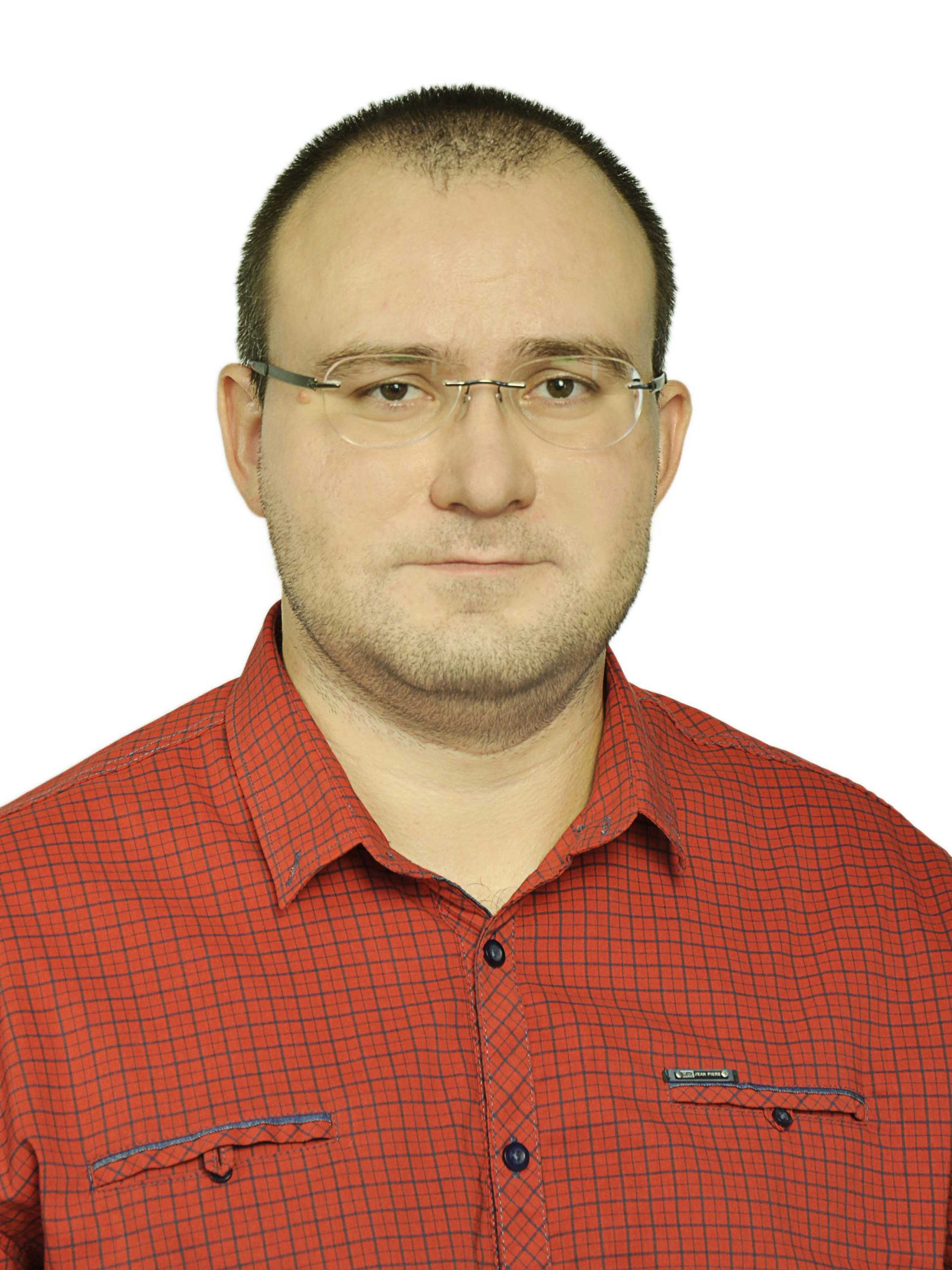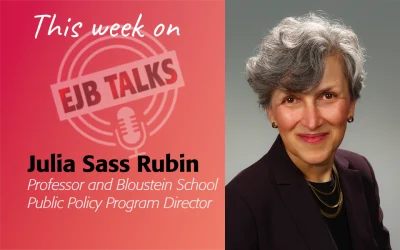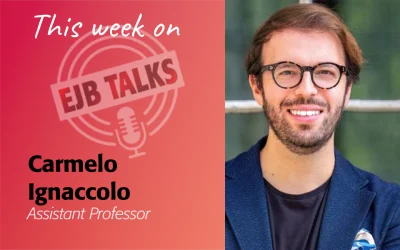SPECIAL EDITION EPISODE 2: The world continues to watch as the Russian invasion of Ukraine disturbingly continues. In this timely, special edition of EJBTalks, Stuart Shapiro talks with Bloustein doctoral candidate Sergei Kostiaev. A native of Russia, Sergei discusses his previous academic research and study comparing political cultures of Soviet and Nazi elites, and what led to his study of Russian lobbying in the United States. He gives Stuart and the listening audience a firsthand account of how life in Russia changed under Putin–eliminating critical media, eliminating opposition, and eliminating any other centers of power that could oppose him. The two discuss what is currently happening including Putin’s miscalculation regarding the united response from the U.S., Europe, Canada, and Japan to impose heavy sanctions that have decimated the Russian economy. Sergei also provides some of the other options Western policymakers may have to further weaken Russia, and ends the discussion with ways individuals can help the Ukrainian people.
Listen to Special Edition Episode 1: The War in Ukraine: A Ukranian Family Member’s Perspective with Bloustein School undergraduate Solomiya Mykolyk and Professor Andrea Hetling.
[toggle title=”Read full transcript”]
Stuart Shapiro
Welcome to EJB Talks. I’m Stuart Shapiro, the Interim Dean of the Bloustein School, and the purpose of this podcast is to highlight the work my colleagues, our alumni, and today, our students in the fields of policy, planning and health are doing to make the world the country in New Jersey a better place.
Today we’re taking a break from this season’s theme of talking to representatives of the centers at Bloustein School to focus on the story that everyone is thinking and talking about, the Russian invasion of Ukraine. My guest today is a Bloustein doctoral student from Russia, Sergei Kostiaev.Thanks for appearing on the podcast Sergei.
Sergei Kostiaev
Hello, good evening… afternoon.
Stuart Shapiro
Yes, well, who knows when people will be listening… ((laughing))
Sergei Kostiaev
Yes.
Stuart Shapiro
So it could be any time a day. Let’s start by getting to know you. Can you talk a little bit about what made you decide to come to the United States to study?
Sergei Kostiaev
Well, in 2000, like 22 years ago, I was studying a curious topic. I was comparing political cultures of Soviet and Nazi elites. And I published a student paper or something. And then I encountered the problem of getting data sources on this topic. And then here, I see advertisement from State Department on various exchange programs like the Fulbright program, the graduate exchange program, etc, etc. So I applied like six times to different programs. And six or seven years later, I got my Fulbright grant to study at Georgetown, in 2007, I think.
So there I studied how United States interest groups try to influence budget appropriations in United States Congress. And then, since Russia had become more belligerent on the international arena, and since I’m studying interest groups for the most part, I started studying and publishing on Russian lobbying in the United States. And after that, I started following US/Russia relations, not only as a citizen, but more professionally. So weirdly, some of my interests started from interest groups digests. And now I’m following very closely US/Russia relations for all the bad reasons.
Stuart Shapiro
Right, right. Well, you know, obviously, many of us have become, you know, amateur followers of US/Russia relations and Russia, in particular, but maybe you can give us a more firsthand account of the Putin regime, which has really covered the last 20 plus years now. How has life in Russia changed under Putin?
Sergei Kostiaev
Initially, in 2008, he [Putin] made very important changes in the Russian system. First, he took control of major national networks, which happened 22 years ago. Later, this censorship increased and he started controlling major business media like Kommersant, [unintelligible] have been published in all of them. So gradually, his control over Russian media moved even from networks to even newspapers, and now websites. That’s one part.
Another part (were) the gradual changes in the political system. An important body in Russian government system is Council Federation. It’s like US Senate. And initially in the 1990s, governors and heads of state legislatures have been members of this Federation Council. So it was a very important body because very important people sat on that council, they blocked multiple proposals for reforms from let’s say, Boris Yeltsin. So what Putin did, he just removed all those people. He changed the constitution. And he moved all those powerful people from like Russian Senate. And now it is just people appointed. They’re not representative of anybody. So these were very important decisions.
And later, after the Beslan tragedy–maybe some of you heard of it–in Beslan, several 100 children had been killed. He made a very strange decision. He said, to better control and to prevent terrorism, governors have to be appointed by me. Later he reversed that decision, but still, now, all aspects of the Russian political system–gradually, it didn’t happen overnight–are controlled by Putin. And then he started removing all the opposition forces. Boris Nemtsov–he was the Vice-Chair of Russian government in the 90s under Yeltsin–he was murdered by the Kremlin walls within a few yards of the Kremlin.
And then we had the poisoning of Alexei Navalny. He was a presidential contender in 2018. So when you see Russians who demonstrate against the war, now in St. Petersburg, Novosibirsk–my hometown–those are extremely courageous people because they could face severe penalties for doing so.
Stuart Shapiro
Yes, the I mean, the steps you outline and given sort of your interests, it seems like it’s straight out of the totalitarian textbook, if you eliminate media, eliminate opposition, eliminate any other centers of power that can contest your power. Am I reading that correctly?
Sergei Kostiaev
Yes, absolutely. But it happened very slowly. So initially, when oil prices had been high for like, most of the 2000s, Russian people just didn’t care–because democracy. Sorry, guys, it’s not in Russian DNA–so people just didn’t care. But then oil prices started decreasing. He annexed Crimea to increase his popularity because in Russian minds, Crimea, it’s like a place where you go for vacation. So everybody in Russia loved to have Crimea back since it was like Russian for the most part of Russian history. So everybody loved it.
But then he started this war with Ukraine in Donbas, it was very limited for like, eight years. But now he decided to escalate. People wonder why this happened. Some people say, because of COVID, he has been isolated. And previously, people who are in charge of economy like central bankers, treasury secretaries, people like that, they had unfettered access to President Putin. So they were be able to come to balance a little bit, a little bit all of those generals, and those Defense Secretaries, KGB, people, etc. But during COVID, economic people lost permanent access to Putin. But military people continued to enjoy unfettered access. So I guess this is why his mindset changed over the last two years. And this is why he is behaving so recklessly.
Stuart Shapiro
Right, right. And it does indeed seem reckless, it seems like a lot of harm is going to come to Russia one way or another as a result of this. And so there is an element of recklessness that one does not associate with someone who’s been very cold and calculating and all of those small steps you talked about earlier.
Sergei Kostiaev
Yes. And like the biggest sanction came today [Friday, February 25] when the US Treasury announced that it was blocking accounts of the Russian Central Bank in the United States. But most importantly–and this is where Putin miscalculated horribly, as most dictators do, because they’re limited in the information–Biden was able to create a huge coalition. He was able to have Europe on board, he was able to have Canada on board, he was able to have Japan on board. So basically, the whole world blocked the Russian central banking system.
And now Russian currencies are in freefall, Russian markets are in freefall, there will be hyperinflation in Russia in the coming months and years. So this was a reckless decision by Putin to invade Ukraine. And I guess the reason was that he thought, Germans, they like Russian gas. And now that they have a different Prime Minister maybe he’s not very strong. And also they have a history with the Germans like the Chancellor, one of the Chancellors in Germany. He’s currently the head of the Rosneft Russian Oil company. So maybe he thought, oh, I’ll give some bribes to some Germans and they won’t block this pipeline. They won’t join these sanctions on the Russian Central Bank. So he made a huge miscalculation, which is costing the Russian people dearly.
Stuart Shapiro
So you mentioned the protests in Russia, and indeed, I agree. Obviously, anyone participating in them is showing tremendous courage. Do you think there’s any chance they will make a difference in Russia or is the state so powerful and the number of dissenters small enough that, that it’s great to see, but it’s not going to make much of a difference?
Sergei Kostiaev
It will make a difference eventually, because when you have hyperinflation, it means your security forces have been enjoying higher standards of living unlike other people who are working in retail, right. But when those people see the salaries evaporate, day by day, I think his grip on the Russian security forces will dissipate. And those protests will make a difference eventually…
Stuart Shapiro
Because they’ll become bigger due to the economic suffering.
Sergei Kostiaev
Yes. And Russian security forces won’t be so eager to beat them and put them in jail because their own cellars are evaporating.
Stuart Shapiro
I see. Gotcha. So you mentioned a few things that we’ve done already. Is there more stuff that the Biden administration and Western policy, in general, should be doing?
Sergei Kostiaev
One thing, what they can do, they can gradually reduce purchases of Russian oil and gas. It would be painful for Europe, mostly. So the Biden administration, I guess would have to invest some resources to offset it. It can’t be done overnight, but a gradual decrease in purchases of Russian oil and gas will put even more pressure on Putin, and he will have to retreat. Or maybe there will be a regime change, because like two-thirds of dictators are removed by a coup.
Stuart Shapiro
Right. Well, there’s always that possibility. You know, I know a lot of people listening to this see the horrible images coming out of Ukraine, and they’re going to get worse in the weeks and months ahead, I suspect, and wonder if there’s anything they can do. Is there anything individual people can do here in this country?
Sergei Kostiaev
I guess lots of international organizations are now trying to provide all kinds of humanitarian assistance. So if you have some, five dollars, where you can chip in for some international organization that is providing some humanitarian assistance to Ukrainians like providing some medicine, providing some shelter, and stuff. Maybe organizations in Poland, which are now helping Ukrainian refugees. You can find probably an organization that is helping Ukrainian refugees in Poland right now.
Stuart Shapiro
Yeah, it so happens I wrote a few down in case people listening do want to make contributions because as we think about the geopolitical implications, and the reasons this is happening, we can really never forget that people are dying and being displaced. As you mentioned, the refugee flows are considerable.
A few places you can focus on are the Ukrainian Congress Committee of America, UCCA. United Help Ukraine, and Nova Ukraine. I’m sure if you Google, you can find other ones. But those are ones that have come to my attention. Sergei, any final thoughts before we let you go?
Sergei Kostiaev
I feel extremely distressed because I have a friend Xander S, who is a Ph.D. student at West Virginia University. And currently, his parents are now under attack in central Ukraine. So this is an extremely personal, sensitive situation for me. My mom, she will suffer from hyperinflation, but his parents are hearing Russian gunfire.
Stuart Shapiro
Yeah, that’s a… that’s a hell of a way to end it, and I really appreciate your coming on and sharing your perspective with us today Sergei.
Sergei Kostiaev
Thanks.
Stuart Shapiro
A big thank you as well as always to Amy Cobb and Karyn Olsen. We’re going to try and do hopefully at least one more podcast on this subject in the next day or two as events continue to develop, and we will see you then. Until then, no matter where you are, stay safe.




